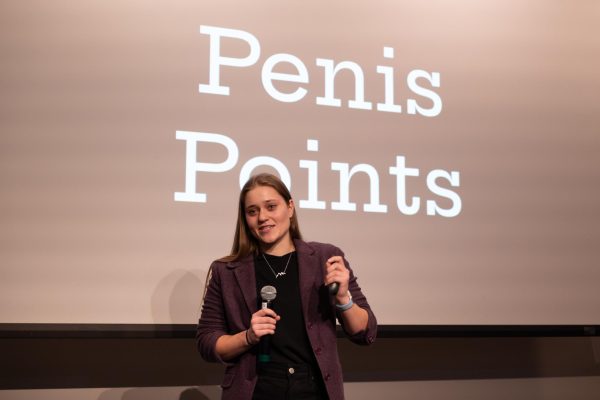Three speakers lit up the stage at TEDxNYU’s spring student speaker spotlight Wednesday evening. The event was hosted at the Kimmel Center for University Life with the theme “Terms and Conditions May Apply,” which explored students’ “stories of navigating the unspoken rules, hidden challenges, and unexpected twists that shaped their journeys.” The president of NYU’s figure skating team, Sophia Domonoske, was one of the students speaking.
“A fun fact about me is that when I was seventeen, I moved away from my family for a boy,” Domonske said. “And the real kicker is that I had only met him once.”
After a few audible gasps, Domonoske quickly clarified that this was for a figure skating partnership and that her dream was to be an ice dancer. In ice dance, there are far more girls than boys, which makes finding a partner a difficult task for aspiring female ice dancers. As a result, it is common for girls, including Domonoske, to leave their hometown in search of a male partner. She explained how a girl’s family will often take on the male partner’s financial burden just to keep him in the sport due to the gender disparity.
In her speech, Domonoske highlighted several prominent issues that arose during her time with her skating partner. For one, her coach scolded her for her diet, even though she was eating healthy food. She was also criticized for what she wore, with rules against baggy, colorful clothing while flawless makeup and hair were expected. She called out male partners who degraded the girls, but coaches excused their behavior by arguing that they needed them more than they needed the girls.
“No one pays attention to the guy, only the girl,” Domonoske said. “Us girls have to be perfect all the time — boys can just be.”
These harmful ideologies are still prevalent even in co-ed competitions, where skaters compete individually, according to Domonoske. In skating, the term “penis points” describes the inflated scores or extra attention that male skaters receive because of their gender. Societal standards labeling skating as “feminine” and “graceful,” can be attributed to the lack of males in the sport. Domonoske said that she feels males tend to be judged at lower standards because judges and coaches want to keep them in the sport. In 2023, the US Figure Skating Association reported that 68% of members were female, and only 29% were male.

“Although there are more girls and women in the sport, we are still fighting to be judged fairly and on the same scale that men are,” Domonoske said.
The constant criticism, comparison and unfair treatment led Domonoske to let go of skating because it was no longer a place of happiness and enjoyment. However, when she started at NYU, she discovered NYU Figure Skating, and her love of the sport was reborn.
“With the help of the team, I relearned my love for figure skating,” Domonoske said. “On this team I feel seen.”
There have been rule changes to even the playing field, which Domonoske says gives her hope for the future. Men were previously allowed to do easier steps in Solo Dance, but there has been a rule change requiring men and women to complete the same, difficult steps. Additionally, Gabriella Papadakis, a French Olympic gold medalist, and Madison Hubbell, an American Olympic gold medalist, started a campaign to promote same-sex ice dance partnerships.
“These changes would embrace the world we’re living in and become a more inclusive environment for everyone,” Domonoske said. “But beware, the terms and conditions of biased skating still apply.”
Contact Isabella Bickenbach at [email protected]


























































































































































